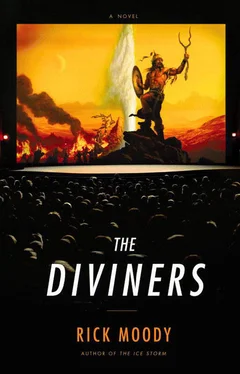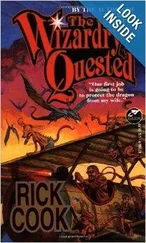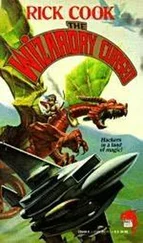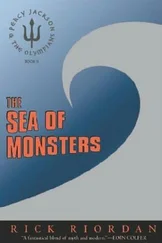Annabel, who according to her New England upbringing never betrays a strong feeling, leans against the wall by the door, her body stooped slightly, like a question mark. She begins to say how hard this is for her and abandons the thought. She begins to say what an awful day it’s been. And she begins to say what it’s like being with him. He can’t stop, however, and into the silence he drives himself; always the two things are together, the worst of him and the best of him. How beautiful she is, incandescent and full of promise. He has depleted her, he has depleted promise, he has fed on promise that is no longer his, he’s kept Annabel’s promise away from all other suitors, kept it away from people who might recognize it, has kept her promise in the vaults of hotel rooms, empty corridors, and stairwells, kept it in his arms, and so he tells her the ending one more time, because knowledge is aphrodisiac for the has-been or the once-was. So it seems in an empty hallway, in front of his door.
Because she’s the baby born in Las Vegas. In 1972.
The bike messenger was once the centaur of the empire. During the junk bond. The bike messenger was Mercury himself, traversing the city in Lycra shorts, sunglasses, tank top. You could make a living at it; you could make fifty thousand dollars a year if you had the heart of a warrior. These nomads flanked the traffic on the avenues from midtown to the financial district and back again. Whistling at one another, shouting curses. A noble calling. As if the bicycle had been fused to the messenger somehow. As if he were affixed to the frame. Only the need for motion. And maybe some amphetamines or cannabis. He was the centaur. No message was undeliverable. Words like wind in the trees. Words at the speed of sound. The messenger made this possible. He made possible the leveraged buyout, the hostile takeover, and its dependent life-forms: lawyers, accountants, consultants.
This according to the unofficial history being compiled, on the slow days, by the owner of Omni Delivery, New York, NY: Ivan Polanski.
In due course, the junk bondsmen were in minimum-security penitentiaries practicing their squash or making license plates and pleading for leniency. After which a new age dawned, which was the age of so-called electronic mail. The age of the computerized electronic mail message, the age of endless trivia communicated as ones and zeros. Polanski was slow in appreciating the dark significance of the electronic mail message. To his regret. He had no computer at home in Glen Cove, and his kids didn’t care, and his wife didn’t care, and no one was trying to e-mail him messages about penile enlargement and barely legal teens. But he could see the difference on his bottom line. He had dealt with the facsimile machine. It had jeopardized his business, but he’d prevailed. He could overcome this. He faxed nothing, personally, wouldn’t even allow one into the office. Screw the clients. He used the telephone and he used his team of highly trained and professional messengers. He had dealt with the facsimile machine and he would deal with this electronic mail nonsense. They waited by the water cooler, his team, they read magazines, they smoked. He didn’t care what they did, as long as they got downtown faster than his rivals. Polanski believed in competition. Competition made Polanski’s business lean. It had made him successful in this country, the first generation of Polanskis to be comfortable. His father spoke no English. Polanski knew what it meant to be successful here; his family had fled Communists. And yet now Ivan Polanski, with roiling innards, selected from a dwindling pool of potential employees. Retirees became part of the workforce. They took the subway trains or surface transit. They whistled while they worked. They were not fleet; they were anything but warriors. They were nice old guys.
And then there was the guilty secret of the industry. The mentally ill. Yes, in truth, schizophrenics made good messengers. They lacked compassion; they were obsessive to a fault. As long as they took their medication, they were great. When they were moving, their symptoms remitted. There were occasional difficulties. Polanski had personally intervened when one of his messengers believed he was being chased by genetically enhanced Mormons. This employee made it from Central Park West to New York Plaza, on the southern tip of the island, in under ten minutes. No car could do it; no train could do it. Only this terrified messenger.
Polanski did what he had to do. He made a note. It said: Hire mentally ill persons. They need work. They have families who want them to be self-reliant. You don’t have to socialize with them. No one else in the business will take the risk. Come hither, hallucinators. Come hither, conspiracy theorists. All of you with early stages of tardive dyskinesia and lithium-related bloating, Ivan Polanski, from the Polanskis of Krakow, welcomes you to the adventure of message delivery. Winning is about risk.
Two years ago, during this personnel initiative, he hired the messenger known as Tyrone. This wasn’t the guy’s name. He had a rich person’s name: William Russell Wellington Duffy. That was the name on the payroll checks. But William Russell Wellington Duffy insisted on being called Tyrone. When he talked, Tyrone sounded like a William Russell Wellington Duffy. He was educated. Had a little bit of the old Bostonian in him. Tyrone was mum on all this, however. During preliminary testing, as with all Omni employees, Tyrone had successfully identified the date and time, three landmarks in downtown Manhattan, and had totaled a list of two-digit numbers. Polanski, as a matter of course, now knew some of the signs of mental illness. Facial masking. Restless legs syndrome. Low affect. Religiosity. High anxiety. Tyrone Duffy had them all.
He hadn’t expected Tyrone to last. Who did last? Sooner or later a messenger was picking imaginary crabs out of his arm and then he was gone. No one lasted. Polanski might not last himself. Tyrone had not been expected to last. His bike was in awful shape, and he disappeared now and then and came back with imaginary tales of dinners with movie stars. Crazy stuff. Hard to tell what he was talking about because there were always a lot of pretentious asides mixed into the monologues. This on the rare occasions when Tyrone talked at all. He once mentioned that his dreadlocks had butterflies living in them and he observed that American cheese contained dangerous radioactive ingredients. Mostly, Polanski had to admonish Tyrone in the area of loafing. Get out there, move some damn packages, after which Tyrone would put a little effort into it, for a few days. Until he got lost again, inside the public library, where Tyrone claimed to be compiling a paper on alpha particles and gold foil. One time, a note from the library arrived in which Omni Delivery was asked to serve as a character reference for one William Russell Wellington Duffy, who wished to be permitted access to a seventeenth-century manuscript on the medicinal properties of English flowers.
Tyrone had a beard in the style of Malcolm X and big thick glasses. He was so thin that he had to be suffering from malnutrition. But whenever Polanski assumed that Tyrone would go the way of the other messengers, into the shelter system, into the Manhattan Bridge homeless encampment, there’d be a revelation. For example, a certain client really preferred Tyrone for all his message delivery needs. For some reason, Tyrone did have good relations with the movie business. They were always asking for him.
And so the Tyrone years lingered at Omni Delivery.
What really went through Tyrone’s mind? What was Tyrone thinking about in his preoccupied way? Polanski wondered. The other messengers, like Edwin (Sanchez) from Delancey Street, kidded Tyrone. They’d give him a loving smack on the side of the head. Tyrone would scarcely indicate that he noticed. “Earth to shuttle, yo.” In all places, at all times, Tyrone replied with the equanimity of the civilly disobedient. Edwin (Sanchez) from Delancey Street, Polanski’s employee of longest standing, indicated that Tyrone preferred the name Tyrone because it was “more black,” and he said that Tyrone had on occasion professed agreement with black separatist political platforms, especially as indicated in the lyrics of a certain hip-hop collective. Edwin said that Tyrone did not appreciate the vernacular in the work of this hip-hop collective, did not favor dialect based on ungrammaticalities, but he understood the aims of hip-hop recording artists and other local separatist movements, supported their work as educators and community organizers. Edwin (Sanchez) from Delancey Street indicated that Tyrone had studied the “great philosophies” at some university out in the middle of the country somewhere but had failed to secure his doctorate, and that Tyrone also made fine-art paintings of some description.
Читать дальше












